

Sans titre. Sans titre. This MCD taught programme is fully accredited by the Royal Town Planning Institute and will introduce you to the essential aspects of town and regional planning.
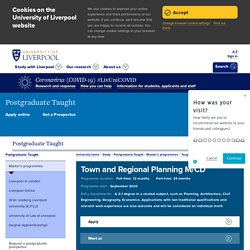
You’ll learn about the social, economic and environmental challenges planners face, whilst becoming familiar with planning tools, methods and how they can be applied to particular planning contexts. Three MCD pathways are available, two of which have been tailored specifically to meet the needs of students who have completed an undergraduate degree in planning at the University of Liverpool or XJTLU: Pathway B (Urban Design) and Pathway C (Spatial Modelling).
Pathway A (Spatial Planning) is intended for students with an undergraduate degree in one of a range of disciplines cognate to planning, such as geography, sociology, environmental studies or politics; or for part-time students working in planning practice. All three MCD pathways are accredited by the Royal Town Planning Institute. Sans titre. The MSc Planning and Urban Leadership is delivered through distance learning, allowing you to choose when and where you learn.
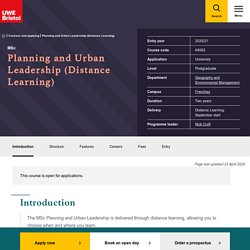
Accreditations and partnerships: Whether you are looking to make a start in the planning and property field or you already work in the profession, this course will provide the core planning education and specialism expertise you need to make your mark in these growing industries. The MSc Planning and Urban Leadership is designed for those who wish to lead change in the built and natural environment. Because the course is delivered entirely through distance learning, you'll be able to fit your studies around other commitments. There's no obligation to live locally as your learning and assessment will take place online. You'll be taught by widely-published academics, who'll bring the benefit of their own industry experience as well as feeding the latest research directly into your learning. Sans titre. Content The optional modules listed are those that are most likely to be available, but they may be subject to change.
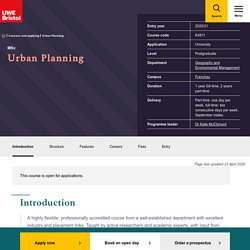
You will study (the number depending on your credit requirements): Plan Making (30 credits) - An introduction to the core skills in conceiving, developing and writing plans for a range of spatial scales in a range of sectors.Implementation and Design Quality (30 credits) - This gives you a practical and theoretical understanding of approaches to managing development through the mechanisms and system of planning. You will also develop an understanding of the analytical skills needed to make your decisions 'outcome-focused'. History and Theory of Urban Planning (30 credits) - A look at some of the main ideas and theories that have shaped urban and rural spatial planning, focusing on the post-world war two era.
Plus optional modules from (the number depending on credit requirements): Please also note this structure is for the full-time course delivery only. Study time. Sans titre. This programme reviews urbanism from colonial to the contemporary period, emphasising demographic, social, economic, cultural and political processes.
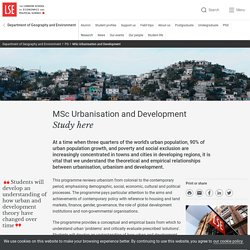
The programme pays particular attention to the aims and achievements of contemporary policy with reference to housing and land markets, finance, gender, governance, the role of global development institutions and non-governmental organisations. The programme provides a conceptual and empirical basis from which to understand urban 'problems' and critically evaluate prescribed 'solutions'.
Students will develop an understanding of how urban and development theory have changed over time, and how these theories combine and conflict in their application to real world situations. This programme is intended for graduates with a good first degree in geography, development, sociology, planning, anthropology or any discipline with a substantive urban or development studies component. Seoul Case Study Programme. Sans titre. Aaron Davis Since graduating from the LSE in Regional and Urban Planning, I have worked for the Prince’s Foundation for Building Community in London, a charity set-up by HRH The Prince of Wales to promote a return of traditional values to architecture and urbanism across the world.
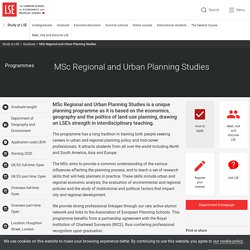
Holding dual-qualifications in landscape architecture and urban planning, I have been involved on a number of projects ranging from a 4,000 home new town in Bahrain, to an urban infill site in North London. The position allows me to use my background in physical design together with the education gained from the LSE in policy and economics. All in all, I couldn’t be happier with the doors LSE opened for me. Chijioke Anosike Why did you choose the course/LSE? I have always been interested in human geography and the combination of an interdisciplinary programme that also offers a concrete career path was attractive. Sans titre. The programme provides a challenging, exciting and dynamic learning experience.
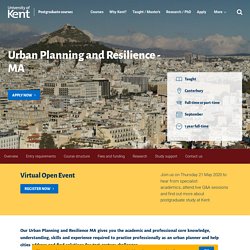
Building on your existing experiences and background knowledge, the MA draws heavily on the Kent School of Architecture and Planning’s work in the University’s European campuses and study centres to develop your research and analytical capabilities. During your studies, you develop an understanding of the planning profession with reference to how people and places interact. You take into account the unique needs and characteristics of different places and people through working with city teams in Canterbury and beyond. You develop a range of problem solving, interpersonal and teamwork skills across the modules which complement the theory and enhance its application in practice. We develop your ability to work effectively within business, social and neighbourhood forums. Master in Urban Studies.
Master in Urban Studies.